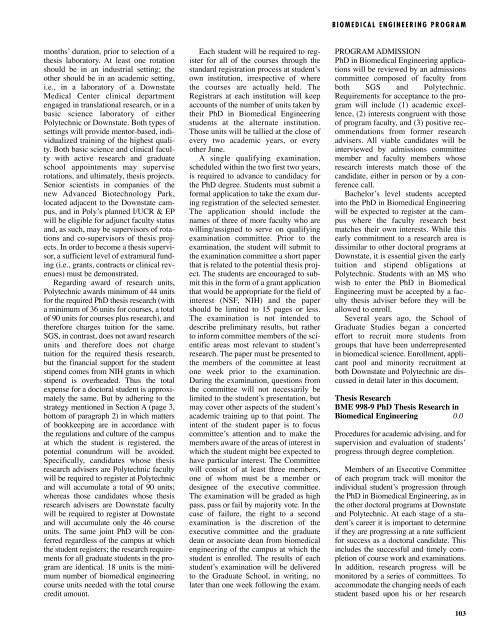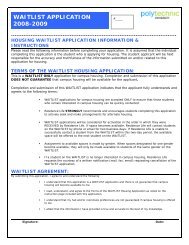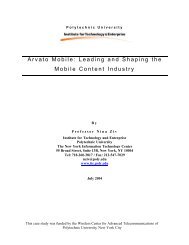POLYTECHNIC UNIVERSITY 2005-2007
POLYTECHNIC UNIVERSITY 2005-2007
POLYTECHNIC UNIVERSITY 2005-2007
Create successful ePaper yourself
Turn your PDF publications into a flip-book with our unique Google optimized e-Paper software.
BIOMEDICAL ENGINEERING PROGRAM<br />
months’ duration, prior to selection of a<br />
thesis laboratory. At least one rotation<br />
should be in an industrial setting; the<br />
other should be in an academic setting,<br />
i.e., in a laboratory of a Downstate<br />
Medical Center clinical department<br />
engaged in translational research, or in a<br />
basic science laboratory of either<br />
Polytechnic or Downstate. Both types of<br />
settings will provide mentor-based, individualized<br />
training of the highest quality.<br />
Both basic science and clinical faculty<br />
with active research and graduate<br />
school appointments may supervise<br />
rotations, and ultimately, thesis projects.<br />
Senior scientists in companies of the<br />
new Advanced Biotechnology Park,<br />
located adjacent to the Downstate campus,<br />
and in Poly’s planned I/UCR & EP<br />
will be eligible for adjunct faculty status<br />
and, as such, may be supervisors of rotations<br />
and co-supervisors of thesis projects.<br />
In order to become a thesis supervisor,<br />
a sufficient level of extramural funding<br />
(i.e., grants, contracts or clinical revenues)<br />
must be demonstrated.<br />
Regarding award of research units,<br />
Polytechnic awards minimum of 44 units<br />
for the required PhD thesis research (with<br />
a minimum of 36 units for courses, a total<br />
of 90 units for courses plus research), and<br />
therefore charges tuition for the same.<br />
SGS, in contrast, does not award research<br />
units and therefore does not charge<br />
tuition for the required thesis research,<br />
but the financial support for the student<br />
stipend comes from NIH grants in which<br />
stipend is overheaded. Thus the total<br />
expense for a doctoral student is approximately<br />
the same. But by adhering to the<br />
strategy mentioned in Section A (page 3,<br />
bottom of paragraph 2) in which matters<br />
of bookkeeping are in accordance with<br />
the regulations and culture of the campus<br />
at which the student is registered, the<br />
potential conundrum will be avoided.<br />
Specifically, candidates whose thesis<br />
research advisers are Polytechnic faculty<br />
will be required to register at Polytechnic<br />
and will accumulate a total of 90 units;<br />
whereas those candidates whose thesis<br />
research advisers are Downstate faculty<br />
will be required to register at Downstate<br />
and will accumulate only the 46 course<br />
units. The same joint PhD will be conferred<br />
regardless of the campus at which<br />
the student registers; the research requirements<br />
for all graduate students in the program<br />
are identical. 18 units is the minimum<br />
number of biomedical engineering<br />
course units needed with the total course<br />
credit amount.<br />
Each student will be required to register<br />
for all of the courses through the<br />
standard registration process at student’s<br />
own institution, irrespective of where<br />
the courses are actually held. The<br />
Registrars at each institution will keep<br />
accounts of the number of units taken by<br />
their PhD in Biomedical Engineering<br />
students at the alternate institution.<br />
Those units will be tallied at the close of<br />
every two academic years, or every<br />
other June.<br />
A single qualifying examination,<br />
scheduled within the two first two years,<br />
is required to advance to candidacy for<br />
the PhD degree. Students must submit a<br />
formal application to take the exam during<br />
registration of the selected semester.<br />
The application should include the<br />
names of three of more faculty who are<br />
willing/assigned to serve on qualifying<br />
examination committee. Prior to the<br />
examination, the student will submit to<br />
the examination committee a short paper<br />
that is related to the potential thesis project.<br />
The students are encouraged to submit<br />
this in the form of a grant application<br />
that would be appropriate for the field of<br />
interest (NSF, NIH) and the paper<br />
should be limited to 15 pages or less.<br />
The examination is not intended to<br />
describe preliminary results, but rather<br />
to inform committee members of the scientific<br />
areas most relevant to student’s<br />
research. The paper must be presented to<br />
the members of the committee at least<br />
one week prior to the examination.<br />
During the examination, questions from<br />
the committee will not necessarily be<br />
limited to the student’s presentation, but<br />
may cover other aspects of the student’s<br />
academic training up to that point. The<br />
intent of the student paper is to focus<br />
committee’s attention and to make the<br />
members aware of the areas of interest in<br />
which the student might bee expected to<br />
have particular interest. The Committee<br />
will consist of at least three members,<br />
one of whom must be a member or<br />
designee of the executive committee.<br />
The examination will be graded as high<br />
pass, pass or fail by majority vote. In the<br />
case of failure, the right to a second<br />
examination is the discretion of the<br />
executive committee and the graduate<br />
dean or associate dean from biomedical<br />
engineering of the campus at which the<br />
student is enrolled. The results of each<br />
student’s examination will be delivered<br />
to the Graduate School, in writing, no<br />
later than one week following the exam.<br />
PROGRAM ADMISSION<br />
PhD in Biomedical Engineering applications<br />
will be reviewed by an admissions<br />
committee composed of faculty from<br />
both SGS and Polytechnic.<br />
Requirements for acceptance to the program<br />
will include (1) academic excellence,<br />
(2) interests congruent with those<br />
of program faculty, and (3) positive recommendations<br />
from former research<br />
advisers. All viable candidates will be<br />
interviewed by admissions committee<br />
member and faculty members whose<br />
research interests match those of the<br />
candidate, either in person or by a conference<br />
call.<br />
Bachelor’s level students accepted<br />
into the PhD in Biomedical Engineering<br />
will be expected to register at the campus<br />
where the faculty research best<br />
matches their own interests. While this<br />
early commitment to a research area is<br />
dissimilar to other doctoral programs at<br />
Downstate, it is essential given the early<br />
tuition and stipend obligations at<br />
Polytechnic. Students with an MS who<br />
wish to enter the PhD in Biomedical<br />
Engineering must be accepted by a faculty<br />
thesis adviser before they will be<br />
allowed to enroll.<br />
Several years ago, the School of<br />
Graduate Studies began a concerted<br />
effort to recruit more students from<br />
groups that have been underrepresented<br />
in biomedical science. Enrollment, applicant<br />
pool and minority recruitment at<br />
both Downstate and Polytechnic are discussed<br />
in detail later in this document.<br />
Thesis Research<br />
BME 998-9 PhD Thesis Research in<br />
Biomedical Engineering 0.0<br />
Procedures for academic advising, and for<br />
supervision and evaluation of students’<br />
progress through degree completion.<br />
Members of an Executive Committee<br />
of each program track will monitor the<br />
individual student’s progression through<br />
the PhD in Biomedical Engineering, as in<br />
the other doctoral programs at Downstate<br />
and Polytechnic. At each stage of a student’s<br />
career it is important to determine<br />
if they are progressing at a rate sufficient<br />
for success as a doctoral candidate. This<br />
includes the successful and timely completion<br />
of course work and examinations.<br />
In addition, research progress will be<br />
monitored by a series of committees. To<br />
accommodate the changing needs of each<br />
student based upon his or her research<br />
103




